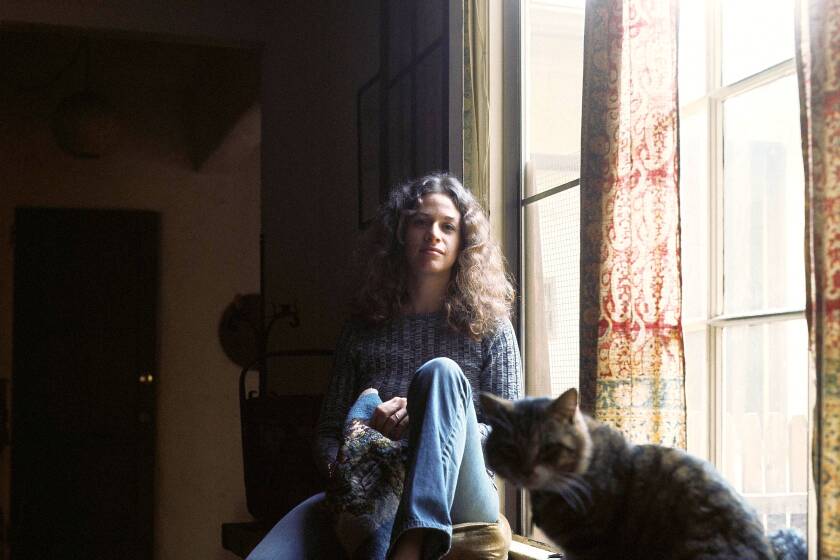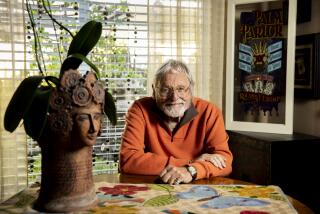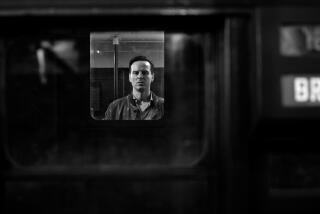Ricky Powell, the famed “fourth Beastie Boy,” a self-taught photographer whose rakish style of urban portraiture chronicled New York City during one of its greatest creative explosions, died at home in Manhattan on Monday. He was 59.
His family lawyer told The Times that he died from heart failure.
Powell captured the early stars of hip-hop when the movement was on the cusp of mainstream prominence. His iconic portraits of 1980s Def Jam recording artists Run-D.M.C., LL Cool J, Public Enemy and especially the Beastie Boys gave this loud new street music a distinct visual presence. And his decade-long partnership with the Beastie Boys produced foundational images of downtown hipster emissaries to global youth culture.
With the loose-limbed baller charm of a New York street kid, Powell moved easily between Black and white New York, his photography style recognizably a product of hip-hop itself: a loose, spontaneous means of seizing the moment with available tech. This point-and-shoot sprezzatura chronicled a moment when modern artists, actors, musicians and intellectuals mingled, chatted and danced together in the same nonstop, borough-wide after party. “He had a serious presence all over the city,” actor Laurence Fishburne recalls in Josh Swade’s forthcoming documentary “Ricky Powell: The Individualist.” “He was not an outsider looking in, he wasn’t some anthropological thief, he was a part of it.”
Carole King left her life in New York for L.A., and with the support of friends like James Taylor wrote “Tapestry,” one of the best-loved albums ever.
His candid street shots from this time, many taken while working various day gigs, froze the likes of Madonna, Cindy Crawford, Mike Tyson and other boldfaced New Yorkers in their off-hours. He shot one black-and-white portrait of Jean-Michel Basquiat when the artist was a customer at Powell’s sidewalk Frozade stand, and another of Basquiat with Andy Warhol when he spotted them arriving at the Soho opening of their collaborative 1985 show.
“Ricky’s work was a collaboration on both sides of the camera,” says Jesse Cory, co-founder of 1xRun, who published the new anthology of Powell’s work, “The Individualist.” “What makes his work art and not commercial photography is that it doesn’t feel premeditated, and the camera is a reflection of both parties.”
Curator and writer Bill Adler says Powell’s work was not amateurish so much as “anti-professional.” “He had a sense of a given moment,” says Adler, whose Eyejammie Fine Art Gallery hosted a 2004 show of Powell’s work. “He was a downtown New Yorker who treasured the funkiness and the idiosyncrasies of the city.”
After graduating from official Beastie Boys photographer to high-watt member of the entourage, Powell imprinted his photo signature onto the 1990s. Decamped to Los Angeles for the creation of their second album “Paul’s Boutique,” his wild-style fish-eye lens portraits of the group, their skater friends, punk-rockers and other wild and woolly figures in their demimonde defined much urban image-making of the era. These fly-on-the-wall snapshots also cast Powell’s own persona well beyond the spotlight’s periphery. He appeared in the band’s breakthrough music video, “(You Gotta) Fight for Your Right (to Party)” and was immortalized on the “Paul’s Boutique” song “Car Thief”: “Homeboy, throw in the towel / Your girl got dicked by Ricky Powell.”
Decades before social media, Powell pioneered a mode of self-branding that anyone would recognize today, coining sobriquets like The Lazy Hustler, The Funky Uncle and a dozen others, and shooting proto-selfies. He operated in a vanishing time when he was often the sole scenester with a camera. His amiably off-kilter view of his stratum in New York celebrity came to fullest bloom with the singular series of homemade videos titled “Rappin’ With the Rickster,” which Powell hosted, shot and produced from 1990 to ’96, airing on New York public-access cable TV. Powell invited anyone and everyone into his shambling downtown life: Sonic Youth, Sofia Coppola, Fishburne, cultural heroes from choreographer Merce Cunningham to a visiting Eazy E from N.W.A. “Rapping with the Rickster was maybe peak Ricky Powell,” Beastie Boy Mike D says in “The Individualist.”
Born Ricky Abraham Cordero on Nov. 20, 1961, in Brooklyn, Ricky never knew his father and was raised an only child by single mother Ruth Powell, who survives him and who gave him an eccentric New York childhood. In 1968, the two Powells moved to Manhattan’s Greenwich Village, where grade-schooler Ricky grew up little supervised and immersed in rhythms of the street and nightlife. A schoolteacher by day and nightclub habitué by night, Ruth would occasionally bring her son along to heady nightspots like the bar at Max’s Kansas City, where Powell recalls in “The Individualist,” “She would sit me by the jukebox as she hung out with all these kooks. I grew up quick, dude.”
In the mid-’70s, Powell lived two blocks from Washington Square Park, a self-described “normal regular playground rat.” By his late teens he was an outsized street character known for his swagger on the basketball court and his easy magnetism in clubs like Roxy, Fun Gallery and Danceteria, where hip-hop was coming into being. While studying physical education at Hunter College, he met key figures like Fab 5 Freddy, hip-hop graffiti legends SEEN and Futura, artists such as Keith Haring and Kenny Scharf, young actors like Fishburne and Mazar, and an NYU art student named Amie Hertzig, whose point-and-shoot Minolta camera he borrowed one night to photograph striking couples inside the Roxy. “I’m a fan of interesting people,” Powell explained at a Tribeca Film Festival Q&A on Zoom last year.
Powell dated Hertzig for two years before she dumped him, leaving her Minolta behind in a bag of clothes. When Powell discovered it, he vowed to use the camera to avenge his rejection by gaining some form of fame. Through an East Village softball team that included Matt Dillon and graffiti star Futura, Powell met the editor of downtown magazine Paper, who set him loose on South Bronx hip-hop parties, skateboard parks and downtown art openings for photos in its nightlife section. Soon, he was shooting for Ego Trip, Mass Appeal and other scene mags, as well as the Village Voice and Rolling Stone.
In 1985, he went to a local show by his schoolmate Adam Horowitz’s new band the Beastie Boys, becoming an instant fan and forging a relationship that landed two of his photos on the album sleeve of their smash debut “Licensed to Ill” within his first year as a photographer. Powell stuck around as the group got into skateboard culture, jazz instrumentation and spiritual practices far removed from the early ‘80s New York that brought them together.
Questlove noticed the change when his group The Roots joined a 1994 Beastie Boys tour. As he put it in a Powell memorial Instagram post, “94 Beasties were not the 84 Beasties I grew up on. They were responsible family cats doing meditation & exercising & the wildest [s—] we did was rent out a go-cart race track in Utah.” Unrecovered and unrepentant Powell never found his groove in the new setting.
Deposited back in Manhattan, with dwindling opportunities and growing substance-abuse issues, Powell entered the period Josh Swade documents in “The Individualist,” spending years in the same disheveled West Village apartment, his contact sheets strewn among sneakers, sports memorabilia and discarded clothes.
Yet Powell maintained a curmudgeonly street panache to the end: a b-boy Falstaff, in drooping trousers and white mutton-chop sideburns he called his “Isaac Asimov look,” Powell sauntered around his West Village neighborhood with a Minolta and transistor radio. “I don’t know if music is playing when he’s walking around,” actor Natasha Lyonne says in “The Individualist.” “But in my mind when I look back on it, there’s music playing.”
In the last decade, helped by professional photo assistant and longtime fan Tono Radvany, Powell organized his work, began commissions for high-profile brands and hosted downtown hipster slide shows with his one-of-a-kind narration.
Weeks ago, Powell seemed to speak to a life at the center of moments most participants were too busy living in to document. “Sometimes i think i was born at the wrong time” begins an Instagram post from Powell’s thelazyhustler — then promptly ends: “On 2nd thought, nah.”
“Ricky caught that last great essence,” Fab 5 Freddy says in “The Individualist.” “That last great period of that realness flowing up and down those streets.”
More to Read
The biggest entertainment stories
Get our big stories about Hollywood, film, television, music, arts, culture and more right in your inbox as soon as they publish.
You may occasionally receive promotional content from the Los Angeles Times.









